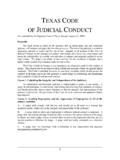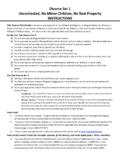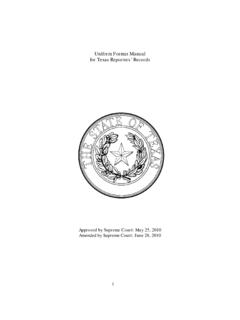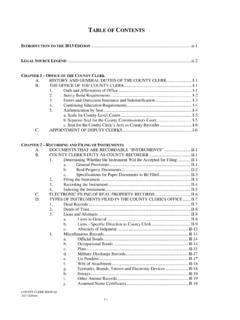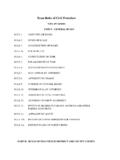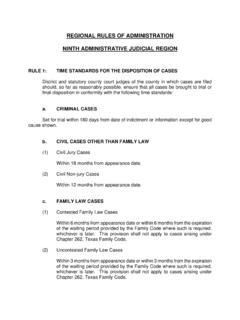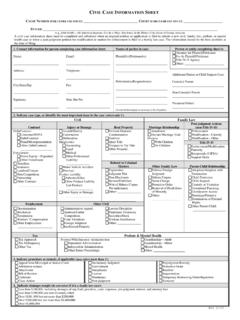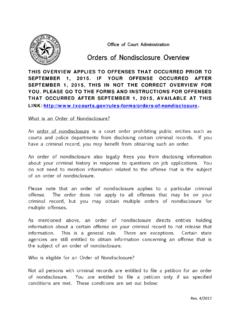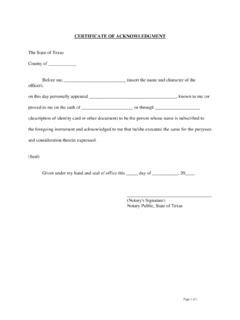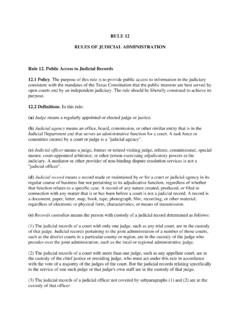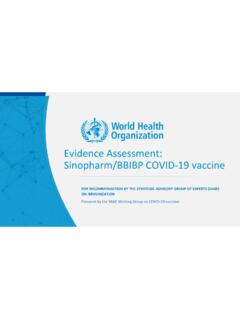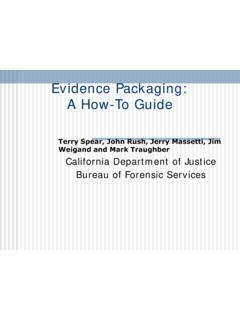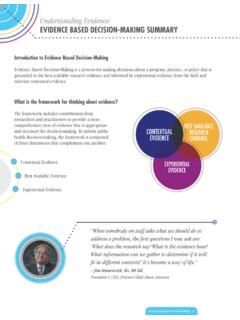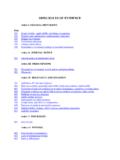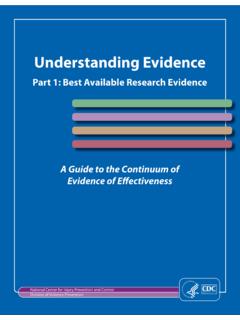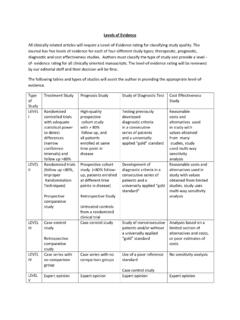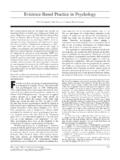Transcription of TEXAS RULES OF EVIDENCE - txcourts.gov
1 TEXAS RULES OF EVIDENCE Effective April 1, 2015 ARTICLE I. GENERAL PROVISIONS Rule 101. Title, Scope, and Applicability of the RULES ; Definitions Rule 102. Purpose Rule 103. Rulings on EVIDENCE Rule 104. Preliminary Questions Rule 105. EVIDENCE That Is Not Admissible Against Other Parties or for Other Purposes Rule 106. Remainder of or Related Writings or Recorded Statements Rule 107. Rule of Optional Completeness ARTICLE II. JUDICIAL NOTICE Rule 201. Judicial Notice of Adjudicative Facts Rule 202. Judicial Notice of Other States Law Rule 203. Determining Foreign Law Rule 204. Judicial Notice of TEXAS Municipal and County Ordinances, TEXAS Register Contents, and Published Agency RULES ARTICLE III. PRESUMPTIONS Rule 301. [No RULES Adopted at This Time] ARTICLE IV. RELEVANCE AND ITS LIMITS Rule 401. Test for Relevant EVIDENCE Rule 402. General Admissibility of Relevant EVIDENCE Rule 403.
2 Excluding Relevant EVIDENCE for Prejudice, Confusion, or Other Reasons Rule 404. Character EVIDENCE ; Crimes or Other Acts Rule 405. Methods of Proving Character Rule 406. Habit; Routine Practice Rule 407. Subsequent Remedial Measures; Notification of Defect Rule 408. Compromise Offers and Negotiations Rule 409. Offers to Pay Medical and Similar Expenses Rule 410. Pleas, Plea Discussions, and Related Statements Rule 411. Liability Insurance Rule 412. EVIDENCE of Previous Sexual Conduct in Criminal Cases ARTICLE V. PRIVILEGES Rule 501. Privileges in General Rule 502. Required Reports Privileged By Statute Rule 503. Lawyer Client Privilege Rule 504. Spousal Privileges Rule 505. Privilege For Communications to a Clergy Member Rule 506. Political Vote Privilege Rule 507. Trade Secrets Privilege Rule 508. Informer s Identity Privilege Rule 509. Physician Patient Privilege 2 Rule 510.
3 Mental Health Information Privilege in Civil Cases Rule 511. Waiver by Voluntary Disclosure Rule 512. Privileged Matter Disclosed Under Compulsion or Without Opportunity to Claim Privilege Rule 513. Comment On or Inference From a Privilege Claim; Instruction ARTICLE VI. WITNESSES Rule 601. Competency to Testify in General; Dead Man s Rule Rule 602. Need for Personal Knowledge Rule 603. Oath or Affirmation to Testify Truthfully Rule 604. Interpreter Rule 605. Judge s Competency as a Witness Rule 606. Juror s Competency as a Witness Rule 607. Who May Impeach a Witness Rule 608. A Witness s Character for Truthfulness or Untruthfulness Rule 609. Impeachment by EVIDENCE of a Criminal Conviction Rule 610. Religious Beliefs or Opinions Rule 611. Mode and Order of Examining Witnesses and Presenting EVIDENCE Rule 612. Writing Used to Refresh a Witness s Memory Rule 613. Witness s Prior Statement and Bias or Interest Rule 614.
4 Excluding Witnesses Rule 615. Producing a Witness s Statement in Criminal Cases ARTICLE VII. OPINIONS AND EXPERT TESTIMONY Rule 701. Opinion Testimony by Lay Witnesses Rule 702. Testimony by Expert Witnesses Rule 703. Bases of an Expert s Opinion Testimony Rule 704. Opinion on an Ultimate Issue Rule 705. Disclosing the Underlying Facts or Data and Examining an Expert About Them Rule 706. Audit in Civil Cases ARTICLE VIII. HEARSAY Rule 801. Definitions That Apply to This Article; Exclusions from Hearsay Rule 802. The Rule Against Hearsay Rule 803. Exceptions to the Rule Against Hearsay Regardless of Whether the Declarant Is Available as a Witness Rule 804. Exceptions to the Rule Against Hearsay When the Declarant Is Unavailable as a Witness Rule 805. Hearsay Within Hearsay Rule 806. Attacking and Supporting the Declarant s Credibility ARTICLE IX. AUTHENTICATION AND IDENTIFICATION Rule 901.
5 Authenticating or Identifying EVIDENCE Rule 902. EVIDENCE That Is Self-Authenticating Rule 903. Subscribing Witness s Testimony 3 ARTICLE X. CONTENTS OF WRITINGS, RECORDINGS, AND PHOTOGRAPHS Rule 1001. Definitions That Apply to This Article Rule 1002. Requirement of the Original Rule 1003. Admissibility of Duplicates Rule 1004. Admissibility of Other EVIDENCE of Content Rule 1005. Copies of Public Records to Prove Content Rule 1006. Summaries to Prove Content Rule 1007. Testimony or Statement of a Party to Prove Content Rule 1008. Functions of the Court and Jury Rule 1009. Translating a Foreign Language Document 4 ARTICLE I. GENERAL PROVISIONS Rule 101. Title, Scope, and Applicability of the RULES ; Definitions (a) Title. These RULES may be cited as the TEXAS RULES of EVIDENCE . (b) Scope. These RULES apply to proceedings in TEXAS courts except as otherwise provided in subdivisions (d)-(f).
6 (c) RULES on Privilege. The RULES on privilege apply to all stages of a case or proceeding. (d) Exception for Constitutional or Statutory Provisions or Other RULES . Despite these RULES , a court must admit or exclude EVIDENCE if required to do so by the United States or TEXAS Constitution, a federal or TEXAS statute, or a rule prescribed by the United States or TEXAS Supreme Court or the TEXAS Court of Criminal Appeals. If possible, a court should resolve by reasonable construction any inconsistency between these RULES and applicable constitutional or statutory provisions or other RULES . (e) Exceptions. These RULES except for those on privilege do not apply to: (1) the court s determination, under Rule 104(a), on a preliminary question of fact governing admissibility; (2) grand jury proceedings; and (3) the following miscellaneous proceedings: (A) an application for habeas corpus in extradition, rendition, or interstate detainer proceedings; (B) an inquiry by the court under Code of Criminal Procedure article to determine whether EVIDENCE exists that would support a finding that the defendant may be incompetent to stand trial; (C) bail proceedings other than hearings to deny, revoke, or increase bail; (D) hearings on justification for pretrial detention not involving bail; (E) proceedings to issue a search or arrest warrant; and (F) direct contempt determination proceedings.
7 (f) Exception for Justice Court Cases. These RULES do not apply to justice court cases except as authorized by TEXAS Rule of Civil Procedure 5 (g) Exception for Military Justice Hearings. The TEXAS Code of Military Justice, Tex. Gov t Code , governs the admissibility of EVIDENCE in hearings held under that Code. (h) Definitions. In these RULES : (1) civil case means a civil action or proceeding; (2) criminal case means a criminal action or proceeding, including an examining trial; (3) public office includes a public agency; (4) record includes a memorandum, report, or data compilation; (5) a rule prescribed by the United States or TEXAS Supreme Court or the TEXAS Court of Criminal Appeals means a rule adopted by any of those courts under statutory authority; (6) unsworn declaration means an unsworn declaration made in accordance with Tex. Civ. Prac. & Rem. Code ; and (7) a reference to any kind of written material or any other medium includes electronically stored information.
8 Comment to 2015 Restyling: The reference to hierarchical governance in former Rule 101(c) has been deleted as unnecessary. The textual limitation of former Rule 101(c) to criminal cases has been eliminated. Courts in civil cases must also admit or exclude EVIDENCE when required to do so by constitutional or statutory provisions or other RULES that take precedence over these RULES . Likewise, the title to former Rule 101(d) has been changed to more accurately indicate the purpose and scope of the subdivision. Rule 102. Purpose These RULES should be construed so as to administer every proceeding fairly, eliminate unjustifiable expense and delay, and promote the development of EVIDENCE law, to the end of ascertaining the truth and securing a just determination. Rule 103. Rulings on EVIDENCE (a) Preserving a Claim of Error. A party may claim error in a ruling to admit or exclude EVIDENCE only if the error affects a substantial right of the party and: (1) if the ruling admits EVIDENCE , a party, on the record: 6 (A) timely objects or moves to strike; and (B) states the specific ground, unless it was apparent from the context; or (2) if the ruling excludes EVIDENCE , a party informs the court of its substance by an offer of proof, unless the substance was apparent from the context.
9 (b) Not Needing to Renew an Objection. When the court hears a party s objections outside the presence of the jury and RULES that EVIDENCE is admissible, a party need not renew an objection to preserve a claim of error for appeal. (c) Court s Statement About the Ruling; Directing an Offer of Proof. The court must allow a party to make an offer of proof outside the jury s presence as soon as practicable and before the court reads its charge to the jury. The court may make any statement about the character or form of the EVIDENCE , the objection made, and the ruling. At a party s request, the court must direct that an offer of proof be made in question-and-answer form. Or the court may do so on its own. (d) Preventing the Jury from Hearing Inadmissible EVIDENCE . To the extent practicable, the court must conduct a jury trial so that inadmissible EVIDENCE is not suggested to the jury by any means.
10 (e) Taking Notice of Fundamental Error in Criminal Cases. In criminal cases, a court may take notice of a fundamental error affecting a substantial right, even if the claim of error was not properly preserved. Rule 104. Preliminary Questions (a) In General. The court must decide any preliminary question about whether a witness is qualified, a privilege exists, or EVIDENCE is admissible. In so deciding, the court is not bound by EVIDENCE RULES , except those on privilege. (b) Relevance That Depends on a Fact. When the relevance of EVIDENCE depends on whether a fact exists, proof must be introduced sufficient to support a finding that the fact does exist. The court may admit the proposed EVIDENCE on the condition that the proof be introduced later. (c) Conducting a Hearing So That the Jury Cannot Hear It. The court must conduct any hearing on a preliminary question so that the jury cannot hear it if: (1) the hearing involves the admissibility of a confession in a criminal case; (2) a defendant in a criminal case is a witness and so requests; or (3) justice so requires.
